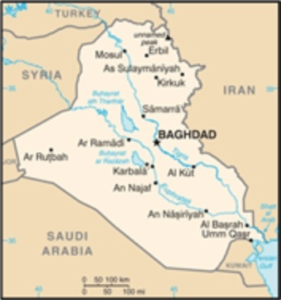Iraqi Kurdistan, 1987-89
What
From 1987 to 1989, Saddam Hussein’s Iraqi government committed genocide against the Kurdish people in Iraq (the Iraqi Kurds).

The World Factbook 2021. Washington, DC: Central Intelligence Agency, 2021. https://www.cia.gov/the-world-factbook/
The Kurds are a Muslim ethnic group indigenous to parts of present-day Turkey, Syria, Iraq and Armenia. For centuries, they have sought to establish an independent Kurdish state. Iraqi Kurds have fought on and off against the Iraqi government since the inception of independent Iraq in 1932.
Where
Iraqi Kurds resided primarily in northern Iraq (Iraqi Kurdistan). Dictator Saddam Hussein saw them as a threat to his control over the oil-rich region of Kirkuk. In the 1960s, he initiated a policy of ‘Arabization’ to secure the territory. This entailed the mass deportation of Iraqi Kurds from their northern homeland to the southern Iraqi desert.
In March 1987, Iraqi official Al-Majid –known as ‘Ali Anfal’ or ‘Chemical Ali’– was given unlimited powers over military operations northern Iraq. Al-Majid led the formal Kurdish Genocide with a campaign of extermination codenamed ‘Operation Anfal.’
How
The Kurdish effort for independence and the resources in their homeland motivated the 1987 genocide. The Iraqi government also retaliated against a military alliance between the Kurds and Iran during the Iran-Iraq war. Iraq responded to the alliance in 1983 by abducting and killing 5,000-8,000 Kurdish men in 1983.
On October 17, 1987, the Iraqi government conducted a population census. Al-Majid used the census to identify the Kurds, as well as some Christians and Yazidis, to be exterminated. Targeted regions in Iraqi Kurdistan were defined as ‘prohibited.’ Operation Anfal involved eight offensives to annihilate the population inside these regions.
Each attack followed a similar pattern. To begin, the military used mustard gas and a nerve agent to kill and terrorize villages and towns. Using these chemical weapons is illegal under international law. Next came conventional bombings, followed by ground assaults. Survivors were rounded up and divided into three groups: men were blindfolded and shot in mass graves; women and children were transferred into prisons; and the elderly were taken to a prison on the border with Saudi Arabia. Hundreds of prisoners died from malnutrition and disease.
Not formally a part of Operation Anfal, the gassing of people in the town of Halabja on March 16, 1988, has come to represent the peak of the atrocities. Survivors describe people dying on the street, at the wheels of cars, and in the midst of daily life. At least 5,000 people were killed, and thousands more suffer long-term health effects.
The Iraqi government claimed that all Iraqi Kurds died during counter-insurgency measures. However, many atrocities were perpetrated after a ceasefire was signed between Iran and Iraq in the summer of 1988. The genocide was a product of meticulous and bureaucratic planning. Kurdish rebels found fourteen tons of documentation in 1991, which were transferred to the US and verified. The detailed documents use euphemisms like “purification” and “liquidation” for mass murder and refer to the Kurds as “saboteurs,” “criminals,” and “human cargo.”
Response
The genocide killed between 50,000 and 100,000 Iraqi Kurds. This number is even higher when accounting for enforced disappearances and undocumented deaths. Additionally, bombs destroyed 90% of all Kurdish villages, many cities, and infrastructure. By September 1988, the Iraqi government declared the operation a success; all Kurdish men over 15 years old had been killed or had fled to Turkey, and resistance was entirely crushed. The violence ended in 1989.
Anfal has had devastating impacts on Iraqi Kurds, including severe economic hardship and long-term health problems caused by the gas attacks. In 1997, the United Nations launched a “Food for Oil” Program, which failed to revive the economy in Iraqi Kurdistan and created a reliance on food imports.
Outside of Kurdistan, recognition for the genocide is rare. It was largely overshadowed by the Iran-Iraq war, and false narratives about the genocide are widespread. The U.S. government was also reluctant to accuse Iraq of the atrocities, because Iraq was an ally in fighting Iran.
Today, survivors have had no justice or compensation. The Kurdish people have no recognized state. In recent years, they have faced a risk of renewed genocide in the Middle East, most notably from Turkey, which has bombed and shelled Kurdish towns and has jailed many Kurdish journalists, activists, and politicians, claiming that these Kurds are ‘terrorist’ militant forces.
Updated by World Without Genocide, 2021.
References
“Genocide in Iraq: The Anfal Campaign Against the Kurds.” https://www.hrw.org/reports/1993/iraqanfal/index.htm#TopOfPage
“Iraq Accused: A Case of Genocide” https://www.nytimes.com/1993/01/03/magazine/iraq-accused-a-case-of-genocide.html
“Iraqi Kurdistan profile.” https://www.bbc.com/news/world-middle-east-28147263
Lemarchand, René. Forgotten Genocides: Oblivion, Denial and Memory. University of Pennsylvania Press, 2011.
“Survivors of the Anfal Kurdish genocide long for closure.” https://www.aljazeera.com/features/2021/4/14/hold-survivors-of-the-anfal-kurdish-genocide-long-for-closure
“The Kurdish Genocide: Achieving Justice through EU Recognition.” https://www.europarl.europa.eu/meetdocs/2009_2014/documents/d-iq/dv/03_kurdishgenocidesofanfalandhalabja_/03_kurdishgenocidesofanfalandhalabja_en.pdf
“The Kurdish massacre survivor’s ‘mission from God’.” https://www.bbc.com/news/world-middle-east-49566429
“The looming genocide against the Kurds: history should not repeat itself.” https://www.opendemocracy.net/en/north-africa-west-asia/looming-genocide-against-kurds-history-should-not-repeat-itself/
“The 1988 Anfal Campaign in Iraqi.” https://www.sciencespo.fr/mass-violence-war-massacre-resistance/fr/document/1988-anfal-campaign-iraqi-kurdistan.html
Totten, Samuel & Parsons, William. Centuries of Genocide: Critical Essays and Eyewitness Accounts. Routledge, 2012.
“Turkey doubles its military presence in Kurdistan: PM.” https://www.genocidewatch.com/single-post/2018/06/05/turkey-doubles-its-military-presence-in-kurdistan-pm
“Turkey: Genocide Emergency November 2020.” https://www.genocidewatch.com/turkey
“Who are the Kurds?” https://www.bbc.com/news/world-middle-east-29702440
“33 years after Iraq chemical attack, survivors still seeking justice.” https://www.france24.com/en/live-news/20210316-33-years-after-iraq-chemical-attack-survivors-still-seeking-justice


